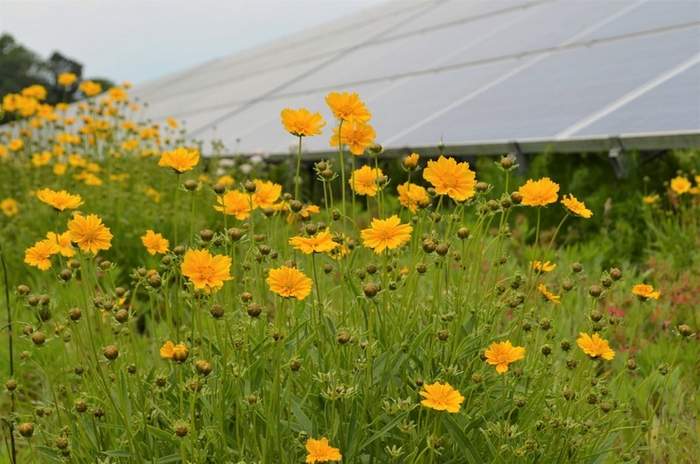Details on Perdue Farms’ commitment to pollinator-friendly solar plants
The pollinator population in the United States has suffered tremendous losses, including the honey bees which American farmers rely on to pollinate crops. That isn’t good! Here’s stat for you: The U.N. Food and Agriculture Organization estimates that 75 percent of food crops rely at least partially on pollination.
But solar farms are becoming an integral part of the effort to turn this trend around as they provide an ideal location for the plants that are beneficial to pollinators. We’ve covered this a bunch.
Recognizing the leadership role it can play in this area, Perdue Farms became the first poultry company in the United States to have pollinator-friendly ground cover at a company solar installation. It is located at the company’s headquarters in Salisbury, Maryland.
“There is a growing body of research that shows pollinator habitat can help increase yields of a variety of fruits and vegetables, including soybeans – one of the key components of a chicken’s diet – so we wanted to do something that has the potential to benefit the environment as well as the farmers near our headquarters,” said Steve Levitsky, vice president of sustainability for Perdue Farms.
[button link=”https://sunmodo.com/nanomount/” bg_color=”#ffad08″ text=”dark”]Solar’s Fastest Attachment
Damaging roof shingles used to be one of solar installers’ worst challenges. Now, the easy, affordable solution is NanoMount™, SunModo’s newest solar mounting innovation. Learn more here. [/button]
Additionally, Levitsky notes, the cost to create and maintain a pollinator habitat is roughly the same as the traditional gravel or grass fill, so there’s no financial barrier to incorporating pollinator-friendly ground cover into the facility.
“Because of these benefits, we are planning to require pollinator-friendly ground cover at future company solar projects in order to provide even more benefits to the communities in which they are located,” he continues. “Asking for pollinator-friendly solar is a great way for electric utilities and corporations to ensure the solar energy they are buying does not result in negative tradeoffs.”
2020 is the first year the habitat has been in bloom. Planting took place in 2018, and it took two years for the seeds to take root and bloom.
In 2017, Perdue Farms was part of a coalition of agriculture, conservation, and energy organizations that advocated for SB 1158, a bipartisan bill to establish a state-wide standard for pollinator-friendly solar in Maryland.
What is pollinator-friendly?
A pollinator-friendly ground cover consists of a variety of flowering plants that provide food in the form of nectar and pollen in each growing season. It contains a mixture of plants that bloom from early spring to late fall so that flowers will be available when pollinators are active. The species were selected to be low-growing to keep from shading the panels, as well as deep-rooted to be resilient to periods of intense sun and rain.
To be a pollinator-friendly solar project in the state of Maryland, a facility must meet or exceed the minimum score set forth in the Solar Site Pollinator Habitat Planning and Assessment scorecard. The assessment includes the percentage of the site with flowering plants, the utilization of native plants, the number of different plants used, and the incorporation of blooming species through different seasons and more.
The company partnered with Fresh Energy, a catalyzer of pollinator-friendly solar, and the Bee and Butterfly Habitat Fund, whose mission is to increase and improve pollinator forage and habitat via their NextGen Habitat Project pollinator-focused seed mixes. The mixes support some of the highest abundance and diversity of plants preferred by monarchs and native bees as well as managed honey bees and other pollinators.
The Perdue Farms habitat consists of 41 different types of flowers and grasses including Black Eyed Susan, Alsike Clover, Sawtooth Sunflower, Narrow-Leaf Milkweed, Purple Coneflower and more. Jim Passwaters, environmental vegetative buffers coordinator for Delmarva Poultry Industry, prepared the site and planted the seeds. In total, more than 250,000 native and pollinator-friendly plants are growing on the solar array adjacent to Perdue Farms’ headquarters.






Comments are closed here.